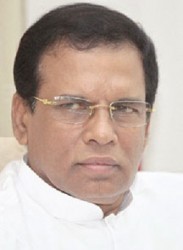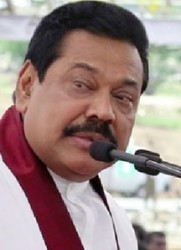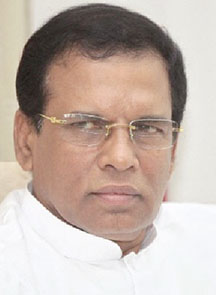COLOMBO, (Reuters) – Sri Lankan President Mahinda Rajapaksa has urged voters to back “the devil they know,” and hand him a third term when they go to the polls on Thursday, rather than an “unknown angel” who promises to root out corruption and political decay.
There have been no reliable opinion polls ahead of the vote, but many believe opposition candidate Mithripala Sirisena will quash Rajapaksa’s bid for re-election and change the country’s direction.
Despite waning popularity, Rajapaksa called the election two years early, confident that the perennially fractured opposition would fail to come up with a credible challenger.
But he did not anticipate the emergence of Sirisena, who quit as one of Rajapaksa’s ministers and crossed to the other side to become the opposition’s candidate in November, triggering a flood of defections from the government.
“It has been a big shock for the president,” said a Western diplomat in Colombo. “The government looks a bit desperate.”
Some 15 million people will be eligible to vote between 7 a.m. and 4 p.m. local time at more than 12,000 polling stations nationwide. Ballot counting will get under way soon after voting booths close, and a result is expected to emerge in the early hours of Friday.
With more than 25,000 local and about 70 foreign monitors set to observe the vote, Chief Election Commissioner Mahinda Deshapriya was adamant on Wednesday that there would be no fraud. “Don’t worry about this election, this election will be free and fair,” he told reporters with a grin.


The government bristled on Wednesday over repeated calls by the United Nations secretary-general to ensure the election is peaceful and inclusive, branding them “gratuitous and inappropriate.”
Nevertheless, rumours have been rife in Colombo that force may be used to keep Sirisena voters away, that the result will somehow be distorted or even that the military might be deployed if Rajapaksa looks set to lose.
In Washington, the U.S. Department of State said the United States wanted to see a “credible, peaceful and inclusive” process.
State Department spokeswoman Jen Psaki said U.S. Secretary of State John Kerry had called Rajapaksa on Tuesday to underscore the government’s responsibility to ensure this.
“We urge the government, its election officials and police, all political parties and actors to ensure access to all vote centers for the voters to vote and counting centers for all international and domestic observers,” she told a regular news briefing.
“We’re concerned about reports of violence and urge the government to ensure transparent and credible investigation into any allegation of fraud or violence,” she added.
A local observer group, the Centre for Monitoring Election Violence, said this week there had been “unparalleled misuse of state resources and media” by Rajapaksa’s party and that police inaction had given free rein to election-related violence.
DWINDLING POPULARITY
Rajapaksa won around 58 percent of the vote in the 2010 election, surfing a wave of popularity that sprang from the defeat of Tamil Tiger separatists who had waged a crippling war against the government for 26 years.
The economy has flourished since then and big infrastructure projects such as the country’s first expressway have sprung up.
Many voters, especially Sinhalese Buddhists who represent 70 percent of the population, are diehard Rajapaksa supporters. Sandamalee de Fonseka, a 39-year-old mother of two in Colombo said he won the country’s war on terrorism and was winning the war against poverty.
“People’s quality of life has gone up,” she said.
But many complain of high living costs – even though official data show inflation below 5 percent – rampant corruption and an authoritarian style that has concentrated power in the hands of the president’s family.

